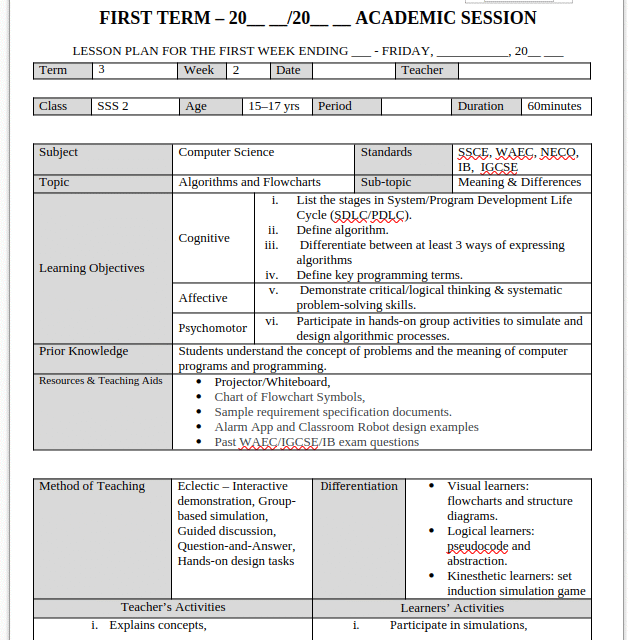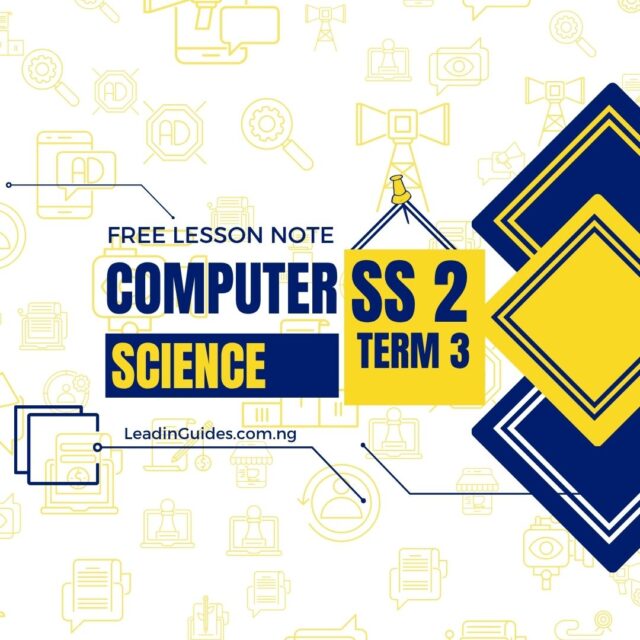Senior Secondary School (SSS) Education Level in Nigeria
What Is the Senior Secondary School Level?
The Senior Secondary School (SSS) level in Nigeria is the final phase of 12 years of basic and secondary education, typically spanning three years — SSS 1 to SSS 3 — for students aged 15 to 18. It is equivalent to Key Stage 5 in the United Kingdom, Grades 10–12 in the United States, and senior cycle in many European systems. This stage is designed to prepare students for higher education, vocational careers, or entrepreneurship.
National Objectives and Core Competencies
According to the National Policy on Education (NPE) and the Revised Senior Secondary Education Curriculum (2011) by the Nigerian Educational Research and Development Council (NERDC), the main objectives of the Senior Secondary School (SSS) level are to:
-
Provide learners with a broad general education while allowing for early specialization.
-
Develop functional trade and entrepreneurial skills for self-reliance.
-
Promote scientific, technological, and critical thinking competencies.
-
Foster patriotism, moral integrity, and civic responsibility.
-
Prepare students for the Senior School Certificate Examination (SSCE) and other higher education entry requirements.
Graduates are expected to leave the SSS level with marketable competencies including:
- Strong foundational knowledge in their chosen academic fields (sciences, humanities, business, etc.).
- Critical thinking and problem-solving abilities.
- Effective communication skills (oral and written English).
- Basic digital literacy and ICT proficiency.
- Applied vocational/technical skills (from the chosen trade subject).
- Entrepreneurial mindset and basic business management understanding.
- Leadership potential and teamwork capabilities.
- Adaptability and a willingness to learn.
Structure of the SSS Curriculum
The Nigerian SSS curriculum, regulated by the Nigerian Educational Research and Development Council (NERDC), is comprehensive and aims to provide both academic excellence and practical skills. It categorizes subjects into compulsory core subjects and elective subjects, allowing students to specialize in areas aligned with their interests and career aspirations.
Fields of Specialization
A student at the Senior Secondary School (SSS) level can specialize in one of four fields of studies. These include:
- Science and Mathematics
- Technology
- Humanities
- Business Studies
Senior Secondary School Subjects in Nigeria
There are seventy-two (72) subjects at the senior secondary school level in Nigeria. These include four (4) compulsory/core subjects, eight (8) Science subjects, nine (9) Technology subjects, twelve (12) subjects in humanities, five (5) subjects in Business Studies, and thirty-four (34) trade subjects. Of these, the national policy on education requires a senior secondary school student in Nigeria to offer a minimum of eight (8) subjects and a maximum of nine (9) subjects.How Students Must Select Subject Combination
Every senior secondary school students in Nigeria must offer the four compulsory subjects. These include English Language, General Mathematics, Civic Education, and one trade subject. These are the core subjects. In addition, each student may then choose two (2), three (3), four (4), or five (5) other subjects from each of their preferred Four Fields of Studies depending on their potential, interest and capability based on the following rules. If a student selects:- two (2) subjects from a Field of Study, they can select two (2) or three (3) subjects from any other Field of Study or from Trade/Entrepreneurship subjects to make a minimum of eight (8) or a maximum of nine (9) subjects.
- three (3) subjects from a Field of Study, they can select one (1) or two (2) subjects from any other Fields of Studies or Trade/Entrepreneurship subjects to make a minimum of eight (8) or a maximum of nine (9) subjects.
- four (4) subjects from a Field of Study, they can select one (1) more subject from any other fields of study or Trade/Entrepreneurship subjects to make a Maximum of nine (9) subjects.
- five (5) from a Field of Study, they have already selected a maximum of nine (9) subjects.
Assessment & Certification
In Nigeria, the final assessment (Senior School Certificate Examination (SSCE)) and valid certification for senior secondary education must be administered by a public statutory examination body in order to ensure uniform standards at this level. At the culmination of the SSS program (SS3), students sit for national/international external examinations to obtain their Senior School Certificate. The major examination bodies and valid senior school certifications are:
- West African Examination Council (WAEC) administers the West African Senior School Certificate Examination (WASSCE) and issues the West African Senior School Certificate (WASSC).
- National Examination Council (NECO) administers the NECO Senior School Certificate Examination (SSCE) and issues the NECO Senior School Certificate.
- National Board for Technical Education (NBTE) administers the National Business/Technical/Vocational Certificate Examinations and issues the National Business/Technical/Vocational Certificate.
- National Board for Arabic and Islamic Studies (NBAIS) administers the Senior Arabic and Islamic Secondary School Certificate Examination (SAISSCE) and issues the Senior Arabic and Islamic Studies Certificate (SAISC).
To SSS Teachers and Schools: Re-prioritizing Holistic Development
The SSS curriculum appears strong on paper. However, recent graduates lack marketable competencies. We observe an over-concentration on knowledge and test results. This focus often ignores character development and critical thinking. It also neglects practical skills and entrepreneurial spirit. Consequently, graduates understand theory but lack practical readiness. They miss the soft skills employers and universities demand.
Dear SSS teachers and administrators, we must re-evaluate our teaching. Shift emphasis from rote memorization. Instead, foster genuine understanding. Promote knowledge application and higher-order thinking. Character building, ethics, and problem-solving are crucial. Teamwork and communication are also vital. These are integral to producing well-rounded individuals. They thrive in a complex world.
Furthermore, recent government regulations have changed vocational teaching. Trade and vocational subjects are no longer exclusive to technical colleges. The National Policy on Education mandates this. All Senior Secondary Schools must now include an entrepreneurship subject. This policy bridges academic learning and practical skills. Schools now can, and must, invest in workshops. They need equipment and qualified instructors. This presents a golden opportunity. We can diversify our graduates’ skill sets. Students will leave SSS with tangible, marketable competencies. These empower them for immediate impact or further training. Let us fully embrace this directive. Transform our SSS system. Prepare students for the 21st-century challenges and opportunities.
Resources for Senior Secondary Schools (SSS)
To support teachers, students, and school administrators in navigating and delivering the SSS curriculum effectively, we’ve developed a comprehensive and growing collection of free resources tailored to the Senior Secondary School level. These include:
-
Lesson Notes aligned with curriculum standards
-
Detailed Lesson Plans to aid classroom instruction
-
Articles and Practical Guides on best practices in teaching and learning
-
Subject-Specific Support Materials across all four fields of study
Whether you’re teaching Science, Humanities, Technology, or Business Studies—or preparing for SSCE—our resources are designed to save you time, enhance your teaching, and improve student outcomes.
👉 Scroll down to explore the full collection.
👉 Use the filter and search boxes to quickly find exactly what you need.
Empower your classroom with relevant, practical, and curriculum-based tools—start exploring now!


